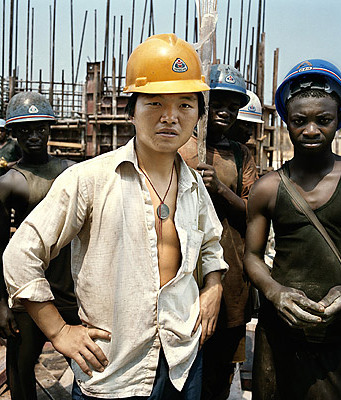China's involvement in Africa: a sympathetic Western view
- By Tim Collard
 0 Comment(s)
0 Comment(s) Print
Print E-mail China.org.cn, August 16, 2012
E-mail China.org.cn, August 16, 2012
|
|
|
China's engagement in Africa [File photo] |
Nobody can object to the furthering of good relations between the world's new economic superpower and a vast continent much in need of development. It is obvious that there can be benefits for both China and Africa in this; China's search for raw materials to feed its economic growth is perfectly natural and legitimate, and Africa does not need raw materials, which it does not yet possess the technology to use, so much as it needs infrastructure and support for the development of small and medium-sized enterprises, which fueled the growth of China thirty years ago. And those are the sectors in which China has developed great expertise.
There should not be anything worrying for anybody in this. Unfortunately, in both the East and West, there remain politically-based suspicions which are unhappy survivors from an earlier, more bellicose era. It is perhaps not unnatural that Western strategists are worried about how a resurgent China will fit into the balance of international security in the 21st century, but it is true that some of us are too quick to see danger in China's expansion of her strategic reach. Likewise, there are still those in China who are still haunted by the spectre of colonialism, suspecting the West of maintaining imperial ambitions in Africa, and of wanting to keep China down so that Western hegemony is not threatened.
This issue was comprehensively discussed during last month's China-Africa summit meeting. It was probably right for President Hu Jintao to lay these issues on the table in his opening speech. But I fear that there are issues in Africa which China has not yet confronted. I am not implying that we British got everything right and understood everything perfectly; but we acquired some useful experiences, both good and bad.
In her dealings with Africa, China promises "no external interference". I have no doubt that this is sincerely meant; China has no record of interfering in another country's internal affairs. But it is very difficult, if not impossible, to acquire extensive economic interests in a country without acquiring political interests too. The West is accused of trying to impose a Western political system on developing countries. Yes, there are some idealists who think like that, but they are not in the majority. What we need to see in a country with which we are engaging is a sustainable political system. China will find the same.
The difficulties which may lie ahead are illustrated by the tragic events of August 4 at the Collum mine in southern Zambia, where a Chinese manager was deliberately crushed to death by some of his workers during a dispute. However good relations may be at the government level, this will actually not help China if relations are not managed well at the grassroots. Industrial relations can be tricky at the best of times, and Chinese managers must adjust to circumstances which are not found back home in China, where there is no tradition of industrial discontent. Africans will not accept high-handed treatment, whether it comes from "colonial oppressors" or "fraternal co-operators". And there will always be an ugly racial element in these conflicts, which can make Africa a very dangerous place to operate. I am not saying that such incidents are the fault of the Chinese; they are more likely to be due to the internal conditions of the host country. China may say that local human rights issues are none of her business, but sometimes Chinese expatriates will find themselves paying the price.
And this can be true in the political sphere as well as the industrial. Until now the Chinese principle of political non-interference has always been equivalent, in practice, to support the government in power. Chinese businesses operating in Africa will tend to do the same, as interests will usually coincide. But African governments, as history shows, do not always have stable foundations. If there is serious political trouble, and the Chinese business community is seen to be closely linked to a particular interest group, there could be a dangerous backlash involving the entire Chinese community. And I assure you that no one in the West wants to see that.
The author is a columnist with China.org.cn. For more information please visit: http://www.china.org.cn/opinion/timcollard.htm
Opinion articles reflect the views of their authors, not necessarily those of China.org.cn.







Go to Forum >>0 Comment(s)